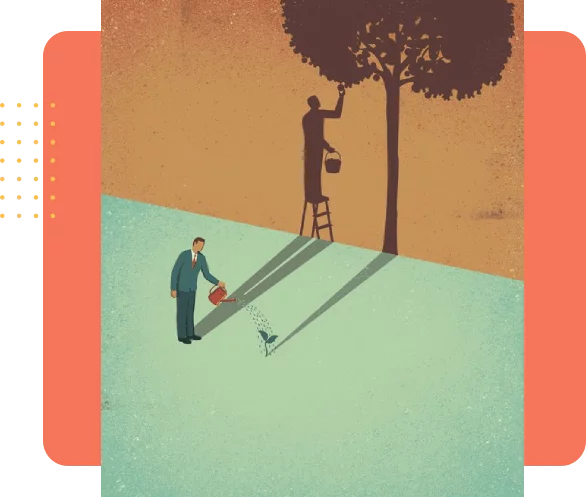Perfection of means and confusion of goals seem, in my opinion, to characterize our age.—Albert Einstein
Ethical dilemmas in leadership happen when decision makers give importance to short term gains over long term values. We see MEI happening at the level of individuals, organizations, countries, societies and cultures as our life is getting enriched but more complex. More so, this phenomenon is happening without us even being aware of it.
Understanding And Overcoming Means And Ends Inversion
The key to overcoming MEI is to cultivate spiritual awareness and understand that we experience reality through our minds. Hence, we must get deeper insight into the workings of our mind. We are the only species that has significant excess mental energy over and above that which is required to fulfill our basic biological needs. This excess energy must be put to use and we do so by using this excess mental energy in asking and trying to answer the existential questions. Yet our minds have limited cognitive capabilities compared to the infinite reality that is all around us (e.g., we see only a tiny sliver of the electromagnetic spectrum). On top of it we are subjected to several cognitive and psychological biases such as confirmation bias, which is the tendency to favor information that supports what we already believe.

False Narratives and MEI
In addition to our limited cognitive abilities, and our inherent biases, we are also subjected to dominant false narratives, which are those stories that we collectively tell ourselves about ourselves, our history, and how the world works. These false narratives that turn out not to be true. For example, we glorify the pursuit of our selfish interests under a narrative that doing so will lead to the overall good for society. We are led to believe in the virtues of rugged individualism instead of seeing the reality of interconnectedness of all life. Another false narrative arises out of the misinterpretation of Darwin’s use of the phrase ‘survival of the fittest’ to mean that we individuals are constantly in a knockdown fight with each other. We will show many more examples of operating false narratives in subsequent communications with our readers
These dominant false narratives become a strong component of the socialized self that we layer over our authentic self in the process of growing up. As the voice of our socially constructed self starts dominating over the voice of our authentic self, we start to make wrong choices that drive us into MEI. We will also look to ways to avoid the obstacles.
Overcoming Means and Ends Inversion with UEF
Ethical dilemmas in leadership can be resolved by aligning decisions with core values than external pressures. With our ethical decision-making training through LLP and insights from world wisdom, you will see that the key is to live consciously and not compulsively. This is the mission of UEF to help our readers with a deeper understanding of false narratives, MEI and how to live consciously, recognising the compulsive nature of modern life everywhere in the world. Our flourishing child program is also aligned with this mission with an exclusive curriculum for children.
In our UEF framework, Love, learn, and play are ends, not means. Means are conditional. They are the things we do. Ends are things we want for their own sake. Ends are the defining, motivating reason we take action. Ends define the kind of flourishing life we want to lead and the kind of people we want to be. What we do is not as important as why we do it.
To understand ultimate ends, ask yourself why.
- Why do I want well-being?
- Why do I want love?
- Why do I want to learn?
- Why do I want to play?
An ultimate end is not a means to anything else. Nothing is worth doing unless the goal is an end in itself.
Means and Ends Inversion in Everyday Life
MEI in Personal Relationships
We confuse means and ends in personal relationships when we focus on what we want other people to do, rather than what we ultimately need and want. For example, we might badger a partner to travel less, take on fewer commitments, simply learn to say no when the real issue is that we want to spend more time together as a family.

MEI in Institutions
Ethical dilemmas in leadership happen when institutions prioritise financial and reputational gains over their purpose. At the institutional level, means crowd out ends in universities when publishing, building bigger endowments or networking are valued above increasing knowledge for students and society. Means crowd out ends in medicine when doctors are incentivized to take on ever more patients and spend less time with them in order to maximize profit instead of maximizing patient wellbeing.
MEI in Society
At the societal level, we may follow the herd, without questioning whether what we value is contributing to our well being. We may constantly strive for attention on social media, obsess over celebrity culture, or care more about net worth than character. The economic/social policies of most countries focus on maximizing GDP. Instead they would be maximizing human dignity.
Finding Clarity Between Means And Ends
How do we achieve the clarity we need to distinguish between means and ends? We ask ourselves whether we value something as an end in and of itself, or as a means to a valuable end. Distinguishing between ends and means keeps us focussed on what matters, on what is likely to increase our wellbeing.
“The privilege of a lifetime is to become who you truly are.” – Carl Jung


